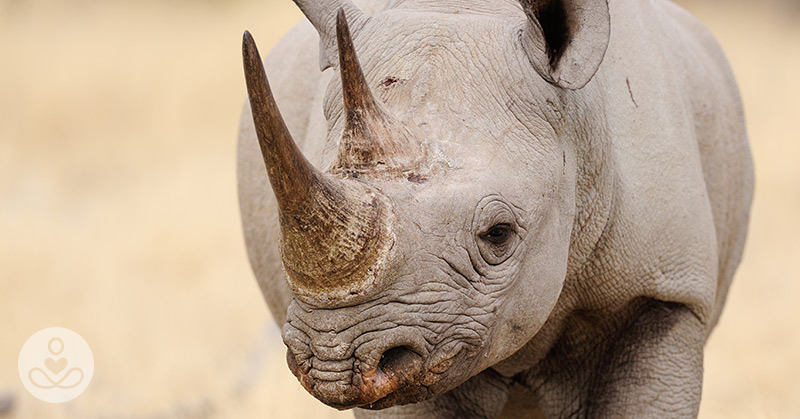According to the International Union for Conservation of Nature, the black rhinoceros is a critically endangered species, with only about 5,500 remaining in the wild. An estimated 2000 make a home in Namibia, Southwestern Africa. The Namibian government permits that only five males can be killed each year.
In May 2018, an American trophy hunter, Chris D. Peyerk from Michigan paid $400,000 to an anti-poaching program in Namibia for permission to kill a 29-year-old black rhino [2]. Peyerk is president of the Dan’s Excavating Inc., a multi-million dollar construction company based in Michigan. He applied to the Federal government of the United States to issue a permit that would allow him to import the rhino’s skin, horns, and skull into the country. According to the Associated Press, the rhino’s meat was distributed to rural communities while the payment would be used for rhino conservation projects, wildlife management, and rural development [3].
Under the newly amended Endangered Species Act, it remains illegal to import trophies of endangered species, unless the animal was found to have been significantly impeding the repopulation or survival of its species in the wild.
The government is highly likely to issue the permit to Peyerk. According to Namibia’s Ministry of Environment and Tourism, the bull killed was sabotaging repopulation efforts from other members of its species in the Mangetti National Park, Namibia.
Unfavorable changes made to the wildlife protection acts
For several years, the U.S issued no permits to trophy hunters seeking to import black rhino parts into the country. However, in 2013, when the population numbers rose significantly in Africa, three permits were issued by the Obama-led administration. In 2017 and 2018, the current administration issued two more, and if this one goes through, it would be a total of six permits issued since 2013.
“Legal, well-regulated hunting as part of a sound management program can benefit the conservation of certain species by providing incentives to local communities to conserve the species and by putting much-needed revenue back into conservation,” said Laury Parramore, spokeswoman for the Fish and Wildlife Service.
A past president of the Safari Club International, Johnson J. Jackson III, is Peyerk’s legal representative in pursuit of the permit. The SCI is a strong advocator and sponsor of proposals for lenient trophy hunting and importation laws. Jackson has also represented a few of the other hunters whose permits were granted.
Jackson was appointed as an advisor to the International Wildlife Conservation Council in 2018, a committee that was set up “to increase awareness of the conservation and economic benefits of United States citizens traveling to foreign nations to engage in hunting.” In other words, the committee helps to promote trophy hunting and protect the right to hunt. Jackson insists that he finds no trouble in advising the council and also representing his clients in such cases as Peyerk’s.
“The permitting is just one cog in the conservation wheel of what we do,” Jackson said to the Associated Press. “We establish and support programs on the ground that enhance the survival of the particular species. Our mission is the recovery of the species population, not the private interest of the hunter.”
Wildlife conservationists rise against the impending decision
The current administration has significantly loosened restrictions on trophy importation from other countries. In 2014 there was a ban placed on importation of lion and elephant trophies. In 2017, the new government lifted the ban on both species, despite reports that the African lion population had decreased by over 42 percent in the past two decades [4]. When Trump described trophy hunting as a “horror show” in a November 2017 tweet, he came under heavy backlash for hypocrisy when photos of his sons’ kills from a 2012 safari surfaced.
The young Trumps released a statement following the criticism they received online for the photos, describing themselves as “avid outdoorsmen.”
Part of it read: “We have the utmost respect for nature and have always hunted in accordance with local laws and regulations. In addition, all meat was donated to local villagers who were incredibly grateful. We love traveling and being in the woods—at the end of the day, we are outdoorsmen at heart.”
The critics didn’t back down, causing Donald Jr. had to personally respond to a couple of them.
Wildlife conservationists and thousands of American citizens haven’t lived these comments down for over seven years now.
“The Trump administration has dealt another blow to wildlife protection,” said Sara Amundson, President of the Humane Society Legislative Fund.
The FWS plans to issue the permit soon
According to Kitty Block, a chief executive of the Humane Society, the Fish and Wildlife Service notified their organization of its plans to approve Peyerk’s permit application. Block explains that before 2014, there were no black rhinos killed in the African wild, but since then, over 80 have been poached. Their horns are illegally sold on the black market and used by Chinese traditionalists for medicine. They are also used as status symbols.
“With rhino poaching on the rise, now is the time to ensure that every living black rhino remains safe in the wild,” Block said. “Black rhinos must be off-limits to trophy hunters. “We urge our federal government to end this pay-to-slay scheme that delivers critically endangered rhino trophies to wealthy Americans while dealing a devastating blow to rhino conservation.”
- a href=”https://www.nytimes.com/2019/09/08/us/trump-black-rhino-trophy-hunter.html”>https://www.nytimes.com/2019/09/08/us/trump-black-rhino-trophy-hunter.html. Retrieved 12-09-19
- Michael Biesecker. US to allow trophy hunter to import body of rare black rhino. Associated Press. https://www.apnews.com/07965e9d21a7428983f14fb38d6c8392. Retrieved 12-09-19
- Meghan Keneally. Trump family’s hunting history reexamined in light of new elephant trophy policy. ABC News. https://abcnews.go.com/US/trump-familys-hunting-history-reexamined-light-elephant-trophy/story?id=51194214. Retrieved 12-09-19
- Lisa Friedman. U.S significantly weakens endangered species act. New York Times. https://www.nytimes.com/2019/08/12/climate/endangered-species-act-changes.html?module=inline. Retrieved 12-09-19
- Safari Club International. Official website. https://www.safariclub.org/. Retrieved 12-09-19
- International Wildlife Conservation Council. FWS. https://www.fws.gov/iwcc/. Retrieved 12-09-19
- The Humane Society Legislative Fund. Official Website. https://www.hslf.org/. Retrieved 12-09-19

